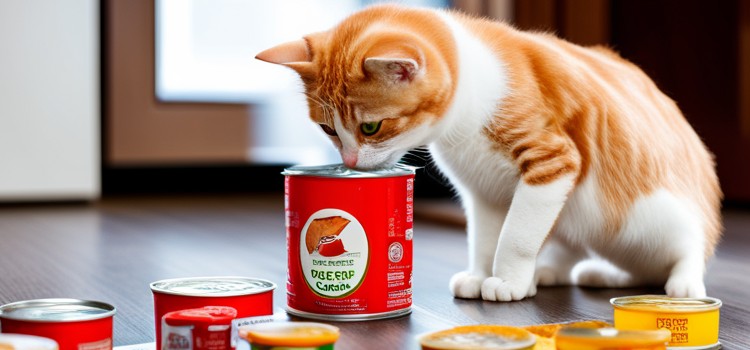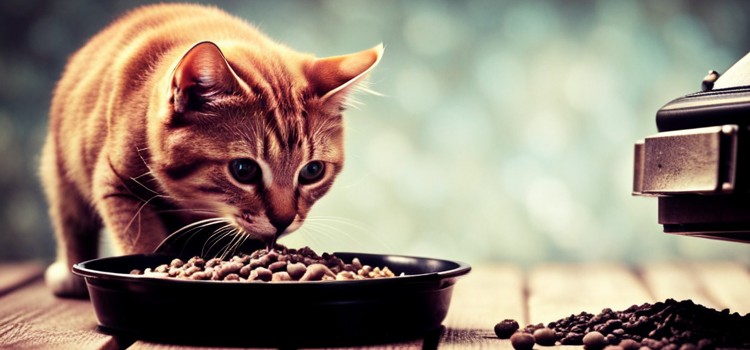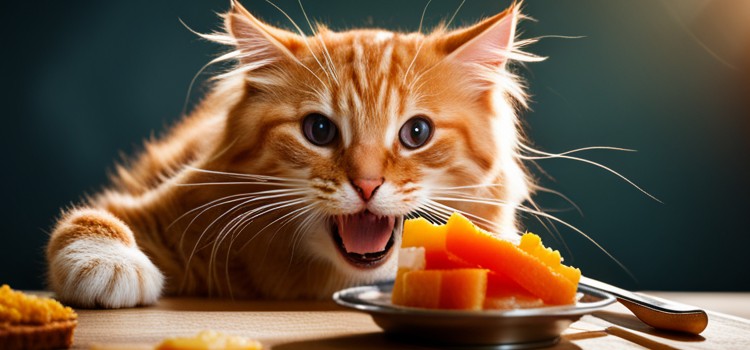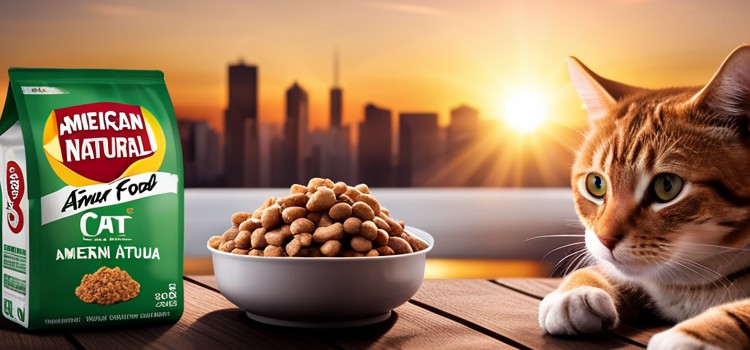As an Amazon Associate committed to the mission of improving the lives of our readers, Live-Clear.com receives a small commission from eligible purchases made through our affiliate links. This revenue enables us to keep producing insightful articles and other material.
No, cats should not eat hot chips as they can be harmful to their digestive system. Cats are curious creatures that often try to eat anything they come across, including human food.
While some human foods can be safe for cats in moderation, hot chips should be avoided due to several reasons. First, the hot temperature can burn their mouths and throat, causing pain and potential injury. Second, most hot chips are seasoned with ingredients like salt, onion, and garlic, which can be toxic to cats.
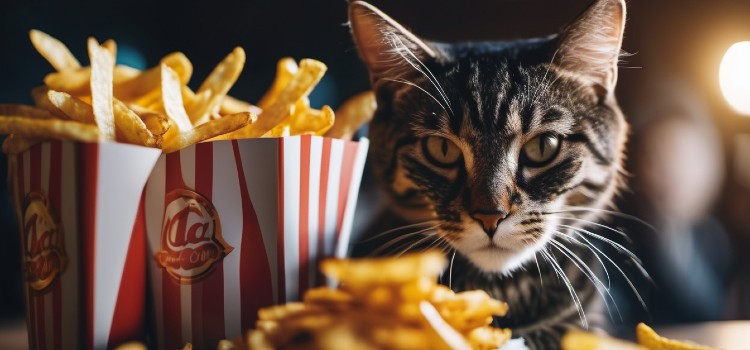
Consumption of these seasonings can lead to digestive issues, such as stomach upset, vomiting, and diarrhea. Additionally, the high-fat content in hot chips can lead to obesity and other health problems in cats. It is essential to provide cats with a balanced and species-appropriate diet to ensure their well-being and avoid potential health risks.
Nutritional Needs Of Cats
Cats have specific nutritional needs, and while they can eat certain human foods in moderation, hot chips should be avoided due to their high salt and fat content, which can harm cats’ health.
Carnivorous Nature Of Cats
Cats are natural carnivores, meaning their bodies are designed to thrive on a diet primarily consisting of animal-based proteins. Unlike humans and some other animals, cats lack certain enzymes in their bodies that are necessary for breaking down plant matter. Their digestive systems and nutrient requirements are specifically adapted to consume and extract the necessary nutrients from meat.
A cat’s teeth and jaws are designed for tearing meat, and their short digestive tract is designed to efficiently process and absorb animal proteins. This means that while cats may occasionally nibble on plants or other non-meat foods, their nutritional needs are best met by a predominantly meat-based diet.
Balanced Diet For Cats
A balanced diet ensures your cat’s long-term health and well-being. A balanced diet for a cat typically consists of high-quality commercial cat food specifically formulated to meet their nutritional needs. These foods are designed to balance proteins, fats, vitamins, and minerals that cats need to thrive. In addition to meat-based proteins, cats require certain nutrients such as taurine, arginine, and other essential amino acids.
These nutrients are abundant in animal tissues, making a meat-based diet essential for their health. Feeding cats a balanced diet also helps prevent deficiencies and minimizes the risk of specific health issues arising from an imbalanced or inadequate diet.
Hazards Of Human Food For Cats
While it may be tempting to share your hot chips or other human snacks with your furry feline friend, it’s essential to be aware of the hazards of certain human foods to cats. Many common human foods can be toxic or harmful to cats, as their bodies cannot process and tolerate these substances. For example, hot chips are usually cooked in oil, seasoned with various spices and flavorings, and often contain high salt levels. These ingredients can cause gastrointestinal upset, pancreatitis, and dehydration in cats. In addition, the high salt content can lead to an electrolyte imbalance, which can have severe health consequences.
It’s important to remember that cats have a different metabolism than humans, and their bodies handle food differently. Feeding cats a steady diet of nutritionally balanced cat food and avoiding sharing human snacks, especially those high in salt, fat, and spices, is crucial for maintaining their health and preventing potential dietary issues.
Hot Chips And Cats
Cats are curious creatures and tend to be interested in whatever their humans eat. One such food item that may catch their attention is hot chips. Hot chips seem delicious, often crispy and flavorful, but can they be safe for our feline friends? In this blog post, we will explore the ingredients and preparation of hot chips, the potential dangers they pose to cats, and the immediate and long-term effects they may experience after consuming them.
Ingredients And Preparation Of Cats Eat Hot Chips
Hot chips are typically made from potatoes, an everyday staple in many households. Slicing the potatoes into thin pieces and deep-frying them until they are golden brown and crispy is a common practice. People often add salt and other seasonings to enhance the flavor.
However, it is essential to note that hot chips, especially those sold commercially, may contain additional ingredients and additives that can harm cats. Some chips may contain onion or garlic powder, which can be toxic to cats and lead to various health issues. The high salt content in hot chips can also adversely affect a cat’s overall well-being.
Potential Dangers Of Cats Eat Hot Chips
While cats may be enticed by hot chips’ crunchy texture and savory aroma, their digestive systems are not designed to handle the ingredients commonly found in these snacks. Cats lack certain enzymes necessary to break down substances like onion and garlic, which can lead to digestive upset, anemia, or even more severe complications.
Ingesting large amounts of salt from hot chips can also be problematic for cats. Excessive salt consumption can cause dehydration and electrolyte imbalances and potentially lead to conditions such as hypertension. Moreover, if a cat consumes hot chips that are still hot, it can burn their mouth and throat, causing discomfort and potential injury.
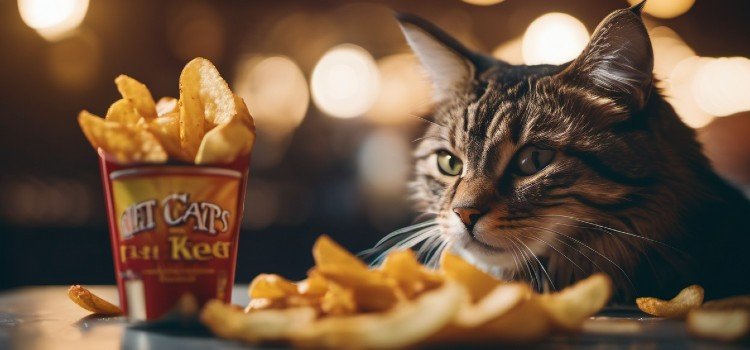
Immediate And Long-term Effects Of Cats Eat Hot Chips
The immediate effects of a cat consuming hot chips can vary depending on their size, health, and the quantity consumed. Cats may sometimes experience digestive issues such as vomiting, diarrhea, or stomach discomfort shortly after ingesting hot chips. These symptoms may subside within a day or two, but monitoring your cat for any signs of worsening condition is crucial.
Long-term effects of feeding hot chips to cats can include weight gain, nutritional imbalances, and an increased risk of developing chronic conditions. The high-fat content in hot chips can contribute to obesity, while the lack of essential nutrients in this snack can lead to deficiencies in a cat’s diet. Always recommend providing cats with a balanced and species-appropriate diet to ensure their optimal health and well-being.
Given the potential dangers and minimal nutritional value, it is best to avoid feeding hot chips to cats altogether. Instead, consider offering your feline companion healthier alternatives, such as plain cooked chicken or fish, prepared explicitly for their dietary needs.
Specific Risks Of Cats Eat Hot Chips
Sharing our favorite snacks with our furry friends might seem tempting. However, it’s essential to be aware of the risks involved. Hot chips, a popular indulgence for many humans, may not be suitable for our feline companions. In this article, we will explore the potential dangers of feeding hot chips to cats under three primary areas of concern: salt and sodium content, seasonings and spices, and oil and fat.
Salt And Sodium Content In Hot Chips
Hot chips are notoriously high in salt and sodium, adversely affecting a cat’s health. Cats have different dietary requirements than humans, and excessive salt intake can lead to dehydration, electrolyte imbalances, and kidney problems. It’s crucial to remember that even small amounts of hot chips can contain high levels of salt that can harm cats.
Seasonings And Spices In Hot Chips
Hot chips often come with various seasonings and spices to enhance their flavor. While these may be appetizing to us, they can be potentially toxic to cats. Certain ingredients commonly found in hot chip seasonings, such as onion powder and garlic, can cause digestive upset, anemia, and even damage a cat’s red blood cells. It’s essential to avoid exposing cats to these seasonings and spices by keeping hot chips away from them.
Oil And Fat In Hot Chips
Oil and fat are prevalent in hot chips, and while they may be harmless to humans when consumed in moderation, cats have a different metabolism. The consumption of fatty foods like hot chips can lead to digestive issues, including vomiting, diarrhea, and pancreatitis. Additionally, the high-fat content in hot chips can contribute to obesity in cats, which increases the risk of various health problems such as diabetes and joint issues.
Symptoms Of Cats Eat Hot Chips
While it may be tempting to share your delicious hot chips with your feline friend, it’s important to be aware of the potential consequences. Cats have specific dietary needs, and certain human foods can be harmful to them. Hot chips fall into this category and can cause various symptoms in cats. Here, we’ll take a closer look at the symptoms of hot chip consumption in cats.
Vomiting And Diarrhea
Feeding your cat hot chips can lead to unpleasant digestive issues. One of the common symptoms is vomiting, which occurs as a result of the spicy and greasy nature of the chips. Additionally, cats may experience episodes of diarrhea, which can further deplete their bodies of essential nutrients and hydration.
Gastrointestinal Upset
Hot chips can cause gastrointestinal upset in cats, leaving them feeling uncomfortable and unwell. This can manifest as abdominal pain, bloating, gas, and a general disturbance in their digestive system. Such symptoms can persist for several hours or even longer, depending on the individual cat’s tolerance and sensitivity to these foods.
Dehydration And Increased Thirst
Consuming hot chips can lead to dehydration in cats. The high sodium content in hot chips can disrupt the water balance in their bodies and trigger excessive thirst. Cats might drink more water than usual as their bodies attempt to compensate for the dehydration caused by the chips.
It’s essential to be vigilant and look out for these symptoms if your cat has consumed hot chips. While an occasional small nibble might not cause severe issues, regular or excessive ingestion can be harmful. Always ensure your feline friend has a nutritionally balanced and species-appropriate diet to maintain their overall health and well-being.

Treatment For Cats Eat Hot Chips
Cats have a reputation for being picky eaters. However, they can sometimes get into mischief and indulge in foods they shouldn’t, including hot chips. The consumption of hot chips can pose potential health risks to your feline friend. If your cat has ingested hot chips, it is crucial to seek prompt veterinary care to ensure their well-being and prevent any complications.
Contacting A Veterinarian
If you suspect that your cat has eaten hot chips, it is essential to contact your veterinarian immediately. Timely communication with a professional can help determine the severity of the situation and provide guidance on the necessary steps. Veterinarians have the expertise to evaluate your cat’s condition and advise on the best action.
Fluid Therapy And Medication
Once you’ve contacted a veterinarian, they may recommend fluid therapy and medication as part of the treatment plan for your cat. Fluid therapy helps to rehydrate your cat and flush out any toxins or irritants that may be present from the hot chips. Medication may also be prescribed to alleviate any gastrointestinal distress or discomfort your cat may be experiencing.
Monitoring And Supportive Care
During recovery, monitoring and providing supportive care for your cat are vital. Monitor your cat for any signs of dehydration, vomiting, diarrhea, or other abnormal symptoms. Provide a quiet and comfortable environment for your cat to rest and recover. Ensure they can access fresh water and offer small, easily digestible meals to avoid further gastrointestinal upset.
Regular communication with your veterinarian is vital to assess your cat’s progress and determine any necessary adjustments to the treatment plan.
Preventing Cats To Eat Hot Chips
If you are a cat owner, you probably know cats are curious creatures who love exploring and trying new things. Unfortunately, this can sometimes lead them to investigate and attempt to eat foods unsuitable for their consumption. One such example is hot chips. While hot chips may be a delicious treat for humans, they can pose a risk to our feline friends. This blog post will discuss tips and strategies to prevent your cat from eating hot chips.
Keeping Hot Chips Out Of Reach
Cats are agile and notorious for their ability to climb and jump to places we may not expect. Therefore, keeping hot chips out of their reach is essential to ensure they don’t indulge in these potentially harmful snacks. Here are a few ways you can do this:
- Place hot chips in a securely closed container or bag and store them in a high cupboard or pantry that your cat cannot access.
- Never leave hot chips unattended on the kitchen counter or dining table, as cats can quickly jump up and help themselves to the tasty treat.
- Consider investing in a pet-proof trash can with a locking mechanism to prevent your cat from rummaging through it in search of discarded hot chip leftovers.
Educating Family Members And Visitors
It’s not just you who needs to be diligent in preventing your cat from eating hot chips. Educating your family members and visitors is equally important. Here’s what you can do:
- Inform your family members about the risks associated with cats consuming hot chips and the importance of keeping them out of their reach.
- Remind guests to be mindful of where they place their hot chip plates to avoid accidental cat snacking.
- If you have young children in the house, teach them the importance of not sharing their snack food with the cat, as it could harm their furry friend.
Alternative Cat-friendly Snacks
While hot chips may not be suitable for cats, it’s crucial to provide them with alternative snacks that are both safe and enjoyable. Here are a few examples of cat-friendly treats you can offer:
| Treat | Description |
|---|---|
| Grain-free cat treats | These treats are specifically formulated for cats and come in a range of flavors to satisfy their taste buds. |
| Frozen tuna cubes | Freeze small pieces of tuna in an ice cube tray for a refreshing and nutritious snack that cats will love. |
| Chicken or turkey jerky | Homemade or store-bought, these meaty treats provide a high protein snack for your feline friend. |
Remember, it’s essential to consult with your veterinarian before introducing any new treats into your cat’s diet to ensure they are safe and suitable for their individual needs.

Conclusion
While hot chips may be tempting to share with your feline friend, it is best to avoid feeding them to cats. The high levels of salt, spices, and oil can lead to digestive issues and obesity in cats. Instead, opt for cat-friendly treats that are specifically made for their dietary needs.
Frequently Asked Questions Of Can Cats Eat Hot Chips
Yes, cats should not be fed hot chips as they can be harmful to their health. The high salt content and spices can cause digestive problems and lead to dehydration in cats.
Hot chips are not directly toxic to cats. However, experts do not recommend them as regular cat food due to their high fat, salt, and spice content. Consuming hot chips can lead to digestive issues and obesity in cats.
If a cat eats hot chips, it may experience upset stomach, vomiting, or diarrhea due to the high fat and spices present in the chips. In some cases, it could lead to more serious health problems such as pancreatitis or gastrointestinal blockage.
It is best to avoid giving hot chips to cats altogether. However, a small amount as an occasional treat may not cause any immediate harm. Additionally, it is important to ensure the chips are plain, unsalted, and cooked without any spices.
Instead of hot chips, consider offering cats healthier treat options. These may include small pieces of cooked poultry, fish, or vegetables. You can also consider purchasing specially-made cat treats that are safe and nutritious for your feline friend.
Remember, your cat’s health and well-being should always be a top priority.
Amazon and the Amazon logo are trademarks of Amazon.com, Inc, or its affiliates.
